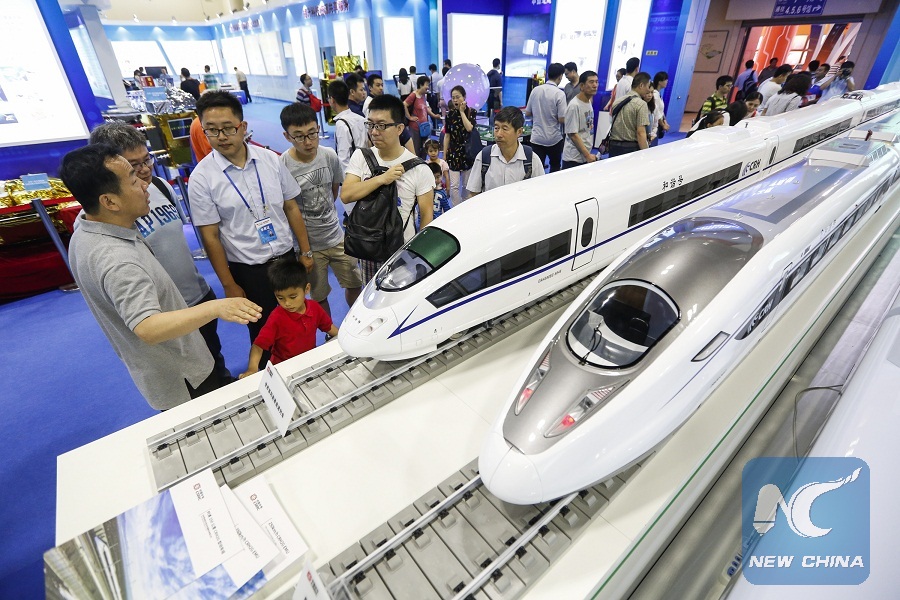
Visitors look at models of high-speed trains made by China Railway Rolling Stock Corporation (CRRC) during an exhibition on China's science and technology achievements during the 12th Five-Year Plan period (2011-2015) in Beijing, capital of China, June 4, 2016. (Xinhua/Shen Bohan)
LONDON, Aug. 14 (Xinhua) -- The climate for innovation in China would have been beyond the expectation of Joseph Needham, the late British scientist and sinologist known for his research on the history of Chinese science, a leading scholar has told Xinhua.
Mei Jianjun, director of the Needham Research Institute in Cambridge, said in an interview with Xinhua that thanks to China's strong investment in innovations and research, the country has made significant achievements in science and technology.
"These innovations have brought dramatic change to the way many Chinese people live their lives," said the professor.
"China's economy and science and technology underwent fast development in the past two decades, and some notable innovations can be seen in the transport and tech sectors such as high speed railway, WeChat (a popular instant messaging mobile application software), bike sharing services and online shopping," Mei said. "Technology and innovation have played an important role in local people's lives."
"It is simply faster in development and bigger in scale in China, thanks to the country's policy that gives great support to scientific and technological development," Mei said.
Such innovation has driven China's companies to the forefront of some pioneering tech sectors. Financial technology, or FinTech has been used to enhance financial services like mobile payment, which nowadays is being widely used in China.
As a scholar, Mei has spent his academic career in both China and Britain before joining the Needham Research Institute as its director. The Institute is named after Joseph Needham, who, over half a century ago, embarked on a long-term project to investigate the scientific and technical contribution that the Chinese people have made to human culture.
Needham's work Science and Civilization in China has helped the West recognize some of the Chinese inventions, including the Four Great Inventions, most of which were thought at the time to be Western inventions.
China has long been a place for innovation, with its "Four Great Inventions" -- Compass, Gunpowder, Papermaking, Printing -- having a large impact on the development of civilization throughout the world.
China has a cultural environment for invention and innovation in science and technology, said Mei.
Such environment has led to the strong growth in not just the tech sector but in basic and applied scientific research, the bedrock of our technological advancement.
Mei believed that when Needham went to China in the 1940s and witnessed the country's struggling scientific and technological development at that time, he would not have imagined that in such a short period of time the country could achieve so much.
"I think if he can live to see China's development at this stage, he will probably be very pleased," the professor said.
China's overall research output has grown significantly in recent years. Globally, the country's share of research papers increased in 14 fields tracked by the Web of Science (WoS) between 2005 and 2015. More importantly, China's share of highly-cited research papers has grown faster than its share of total articles indexed in the WoS.
But to Mei, the country still needs more time to push its scientific and technological development to a higher level.
While China has poured many resources into science and technology, resulting in a dramatic increase in research output, China still lags behind Western countries in some key areas, he said.
"Both China's academia and policy makers may need to strengthen communication, collaboration and work with their counterparts in the West, so that greater progress can be made while consolidating what we have achieved," he added.

